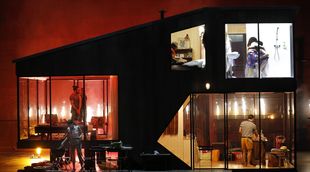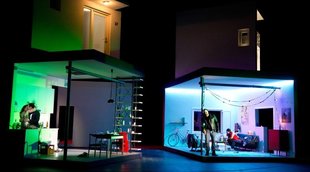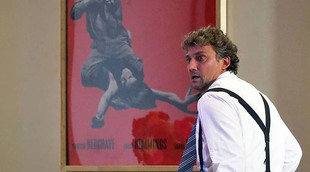 © DR
© DR
In a few days, the premiere of Erich Wolfgang Korngold’s opera, The Dead City, will play in Munich’s Bavarian State Opera. Jonas Kaufmann will be appearing alongside soprano Marlis Petersen in a production by Simon Stone, created in 2015 at the Theater Basel. Let us take a look back at the career of the thirty-year-old director who has been fought over by musical and dramatic institutions alike for some years now.
***

Les Trois Soeurs à l'Odéon, par Simon Stone (c) Pascal Victor/ArtComPress

La Ville Morte au Theater Basel, par Simon Stone (c) Sandra Then
Digging deep into Simon Stone reveals an alternative truth; the part-Australian, part-Swiss director has made a point of unravelling myths and classic theatre and retelling them with a contemporary twist since his very beginnings in Melbourne. Above and beyond the simple, magic formula of transposition, this director is driven by the pure need to rewrite today’s references. When asked "Is it Chekhov?”, he makes us work through our evasive response. In The Three Sisters, which he staged in 2017 at the Odéon, hashtags were used as invective and Britney Spears was sung around the piano. The Russian dramatist’s presence is felt through the permanent dissatisfaction of figures who are overwhelmed by a society they don’t fit into, rather than through original text. Simon Stone justifies his approach as follows: "Chekhov begins all his plays by showing that they take place in the present day, and I take him at his word in this respect." The stage therefore acts as a mirror for the audience.
This magnifying effect works all the better since the scenery chosen by the blue-eyed agitator evokes a laboratory study. Spaces enclosed by three walls, like his Thyestes – which avoids a literal representation of the theme and thus gains in recontextualisation –, or glass boxes – most notably Ibsen’s Wild Duck – reinforce the feeling of experimentation. Technical challenges are close to his heart, with Ibsen's House, a compilation of Ibsen’s work running close to four hours at the Festival d’Avignon in 2017 taking place on a turntable, or the staggering The Trilogy of Revenge which he staged at the beginning of the year at the Odéon-Théâtre de l'Europe, splitting the location into three separate rooms where three plays from separate times ran simultaneously, using the same actors, who made their way from stage to stage via specially designed passageways.
Set challenges do not for one moment mean that he forgets about the actors who are directed ruggedly. Through improvisation or collaboration with the prestigious troupe of Toneelgroep Amsterdam (by Ivo van Hove), the end goal is to attain an alignment of the planets with our condition conjugated in the present. His version of Medea after Euripides is called Anna, and has just left the psychiatric hospital after trying to poison an ungrateful husband who stole the credit and fame for her original work. When mythology meets real-life news, there’s no longer any need for witch hunts. Is Medea just a victim who has crossed a line? These questions are intermingled with the central issues in the opera, and subsequently the Salzbourg Festival entrusted him with Charpentier’s Medea, in August 2019. He makes us stand witness to the current times through his dioramas of selected moments, his brilliantly choreographed living tableaux of everyday life and cinematic transitions right down to the gas station where the character sets light to the car that she has locked her two children inside. Medea leaves voice messages for Jason, Jason has his bachelor party and Dircé takes a selfie in the wedding dress shop. Simon Stone does not hang the suspense on what happens, instead he dissects the psychological workings of a woman who commits infanticide. Guilt is juxtaposed with what we don't see.
In La Traviata, at the Paris Opera, he continues the process of internal exploration by focusing on the oppositions of Violetta’s private life versus public life with a champagne “libiamo” and Alfredo’s declaration of love in the backyard near the dustbins, urban Violetta (in a perfume ad) and rustic Violetta (milking a cow), and full-throated, exacerbated sentiments versus futile discussions by text message, all adding to the enlargement of the characters’ mental mapping. And always within a world that turns and is "constantly changing", where the story revolves more than it progresses, with a device that divides the story into demarcated visual cues that regularly focus the action.
Angels in America (Theater Basel, 2015) deals with AIDS in the intimacy of our theatre boxes, a private place for just ourselves midway between performance and our return outside. As for Lear, by Aribert Reimann (Salzburg Festival, 2017), the director collectively uses spectators as witnesses to the decay of a statesman on a fashion show catwalk, whose flower bed of heavenly blooms representing the kingdom to be shared will quickly be trampled by orgies. The rain hammers down onto the ground, the corpses pile up, and extras are bathed in blood. The disoriented Lear ends up in his underwear, and then appears covered in white with his daughter Cordelia at his bedside. All are indelible images.
What is his perception of reality, outside the realms of cruelty and violence? The tenuous border between reality and illusion is smoothly handled through image and film noir with The Dead City, Stone’s first opera production (Theater Basel, 2016), which reruns in Munich from 18th November. Paul, haunted by the death of his wife, meets Marietta, who looks like his deceased partner, and subsequently the whole show is permeated with the femme fatale of sixties cinema. Polaroids of the couple line a room and posters of the films Blow Up and Pierrot le Fou adorn the walls of the living room and bedroom. Paul is both the stalker and the prey, in search of the truth and yet hounded into a corner. We recognize Simon Stone’s touch here, with elements that appear in his later work, such as the rotating house, the lighting flourishes, the deepest reaches of thought stirred ever so subtly. Cinema is the response to uncertainty, and creates a myth out of story. While he cannot rewrite the librettos of the operas he brings to life, the director takes his characters out of the frame and the screen, making them less heroic and more "normal". In a dual sense, he also transforms our stories of human beings from a slightly stoned world into classics with grand destinies. Is my everyday life superior to the everyday life of an opera character? Imagine if you will, Salome, Iago and the Queen of the Night in an owners’ group meeting for a block of flats!
the 16 of November, 2019 | Print


Comments